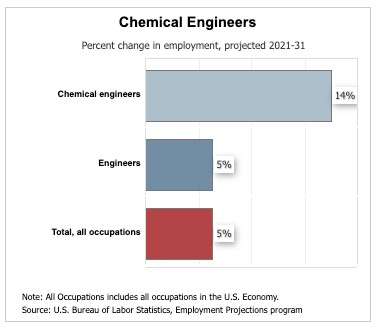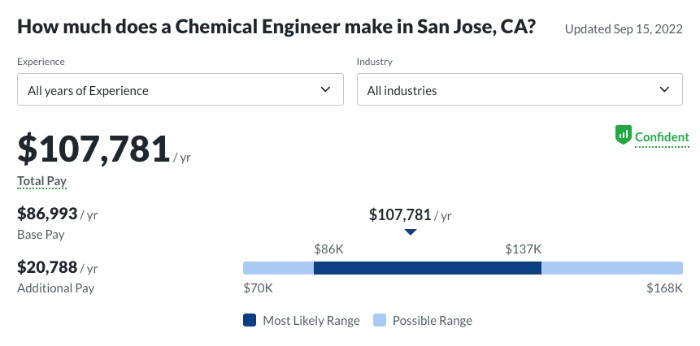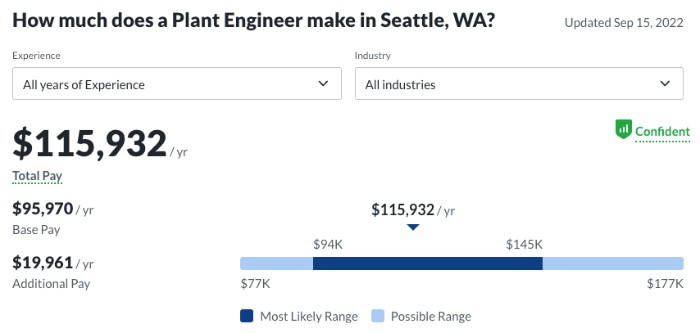Is Chemical Engineering The Right Degree For You?
Are you considering a degree in Chemical Engineering? A degree in Chemical Engineering can open up many doors for you. It is an interdisciplinary field that combines chemistry, physics, biology and mathematics to solve problems and create new materials and products. With this STEM degree, you will gain the knowledge and skills needed to solve complex problems related to sustainable energy production, environmental protection, food processing, and more.
You’ll be able to work with cutting-edge technology while developing innovative solutions for some of the world’s most pressing challenges. Plus, it’s a highly sought-after skill set that can lead to rewarding careers in industry or academia.
Learn more about how a degree in Chemical Engineering could benefit your future by reading this article. I’ll be covering your career options, the demand for such jobs, possible pay, and other alternatives to a chemical engineering degree.
What Is A Chemical Engineering Degree?

A bachelor’s degree in Chemical Engineering is highly sought after as it provides students with knowledge and skills to solve complex problems regarding energy production, environmental protection, food processing, paper manufacturing, life sciences, and more.
This interdisciplinary field combines chemistry, physics, biology and mathematics to create new materials industrial processes and products. With this degree, one can expect to work with cutting-edge science and technology while developing innovative solutions for the world’s most pressing challenges.
How Long Can You Finish A Degree In Chemical Engineering?
A career in Chemical Engineering typically requires a minimum of two years for the completion of an associate’s degree, four years for a bachelor’s degree and five to seven years or more to complete a master’s degree.
In addition to coursework, internships may be required as part of other courses with the same program requirements – these can provide valuable hands-on experience and preparation for a career in chemical engineering.
Career Path and Job Market Demand for Chemical Engineering Degree Graduates
General Score for Career Path and Job Market Demand: 8.5/10
Chemical Engineering graduates have diverse career paths, such as research and development, plant and equipment design, energy production, and environmental protection. They are chemical engineers work can also work on safety regulations, industrial and chemical processes, and environmental solutions. Other possible roles are product development, project management, quality assurance, operations management, and technical sales. They work in various industries, including chemical manufacturing, oil and gas, pharmaceuticals, biotechnology, food processing, and environmental protection.
The job market demand for those with a degree in Chemical Engineering is high – due to the complexity of the profession, there’s often a shortage of qualified professionals to fill available positions. According to projections by the US Bureau of Labor Statistics, the field of chemical engineering is set to experience a substantial growth rate of 14% from 2021-2031, which is noteworthy when compared to the average rate of growth in other fields.
It is expected that approximately 2,000 positions for chemical engineers will become available on a yearly basis throughout this period. Predominantly, these vacancies will emerge as a result of replacing workers who transfer to other alternative energy fields or retire from the workforce.

What Jobs Can You Get With A Chemical Engineering Degree?
A Chemical Engineering degree can lead to various career paths such as research, product development reaction engineering, process design, plant/machinery operation, project management positions, quality assurance, and technical sales. Students can also pursue consulting, regulatory affairs, and safety roles. Chemical engineering graduates have numerous job opportunities available, including:
Chemical Engineer
Chemical engineers design and develop equipment and processes used in the production of chemicals, fuels, foods, medicines and plastics. They may also be responsible for the management of these raw materials and processes, as well as their safety.

Process Engineer
Process Engineers specialize in the design and optimization of chemical manufacturing processes with an emphasis on production efficiency. They are tasked with ensuring that the production process is safe, cost-effective and environmentally friendly.
Environmental Engineer
Environmental Engineers work to protect the environment from potential risks caused by industrial activities. They are responsible for designing and evaluating systems aimed at improving air quality, water quality and soil health care from contamination around industrial plants.
Job Outlook for Chemical Engineering Jobs
General Score for Job Outlook: 8.5/10
The BLS also noted that the need for chemical engineers is heavily influenced by the demand for manufactured chemical products used in various industries. A significant number of these engineers are employed in firms that specialize in producing goods for other companies.
Furthermore, not only is chemical engineering essential in the manufacturing industry but it is also expanding into exciting new fields such as nanotechnology, alternative energies, and biotechnology. This continual migration will undoubtedly help to sustain the demand for engineering services across various industries. Despite this growth in sustainable energy engineering however, it should be noted that due to its smaller size, only an estimated 3,700 new job opportunities will arise within chemical engineering over the next decade.

Are Chemical Engineers Paid Well? (Salary Trend)
General Score for Salary: 10/10
For aspiring chemical engineers, the earning potential looks promising. According to recent data, the median annual salary for chemical engineers is $105,550. This means that half of workers in the field earned below this amount, while the other half earned above it.
For those looking to break into the industry, it’s worth noting that the lowest 10 percent earned less than $62,730, while the top 10 percent earned more than $187,430. So, while salaries can vary widely based on experience and other factors, it’s clear that chemical engineering has the potential to be a lucrative career path.
According to ZipRecruiter, here are the top ten highest paying cities for Chemical Engineering jobs:

To point out, here are some of the individual estimated salaries according to Glassdoor:

In the San Jose, CA area, a Chemical Engineer can expect to earn a total pay of around $107,781 annually, with an average salary of $86,993 per year. These figures are the median values obtained from Glassdoor’s proprietary Total Pay Estimate model, which collects salary information from our users. The estimated extra pay is $20,788 per year, which may come from various sources such as cash bonuses, commissions, tips, and profit sharing.

In the Seattle, WA area, a Plant Engineer can expect to earn a total pay of approximately $115,932 per year, with an average salary of $95,970 per year. The estimated additional pay is $19,961 per year, which may include cash bonuses, commissions, tips, and profit sharing, among other sources.
The Chemical Engineering programs that a chemical engineer can get in school will help attain this salary range. In fact, in a study published by the Georgetown University, chemical engineering ranked number 5 in its ranking of college degrees based on annual salaries.

Are Chemical Engineering Students Happy and Satisfied At Work?
General Score for Job Satisfaction: 8.5/10
Let’s cut to the chase: the Chemical Engineering major ranked first place in terms of job satisfaction in a survey made by PayScale.
The survey showed that Chemical Engineers reported a high level of satisfaction with their jobs, with the majority saying they were “extremely satisfied” and another large portion saying they were “very satisfied.”
This could be attributed to the flexible nature of chemical engineering work, as well as wide range of industries in which it’s used. In addition to this, chemical engineering offers a wide range of opportunities for career growth and advancement. There are also plenty of chances transfer students to specialize in certain areas and gain more knowledge additional training and experience.
All of these factors contribute to a higher job satisfaction rate among chemical engineers, making professional engineer it an ideal choice for transfer students and those looking for a rewarding career path.
How Do Graduates of Chemical Engineering Fare In The Real World?
I have scanned Reddit for some interesting thoughts about Chemical Engineering degrees. I tried to look at how chemical engineering principles and disciplines help process analysis, develop solutions, conduct research and develop critical thinking. Furthermore, I tried to look at the typical duties of a person who graduated with a chemical engineering degree.
What Chemical Engineering Degree Holders Reported About Their Salary
Torn Between Chemical Engineering and Software Engineering?
Where Are Chemical Engineering Jobs Highly Concentrated At?
Is Chemical Engineering The Right College Degree For You?
Many chemical engineers have no regrets choosing Chemical Engineering as their college degree. While circumstances differ, it could also work for you. However, if you really want to be strategic in choosing between Chemical Engineering, Biological Engineering, Biochemical Engineering, or even Software Engineering or Computer Science, here’s my definitive checklist to guide you whether you are up to the challenge of learning Chemical Engineering principles and dive into Chemical Engineering Programs.
| YES | NO | |
| PROSPECTS: What are the job prospects and earning potential for chemical engineers in your area or industry of interest? | ||
| PREREQUISITES: What are the specific educational requirements and prerequisites for pursuing a degree in chemical engineering, and do you meet them? | ||
| INVESTMENT: How much time and money are you willing to invest in your education, and what financial aid or scholarship options are available to you? | ||
| SCHOOL REPUTATION: What is the reputation and accreditation status of the schools or programs you are considering? | ||
| RESOURCES: What kind of resources and support services are available to students in the chemical engineering program, such as academic advising, tutoring, or career counseling? | ||
| LEARNING OPPORTUNITIES: What kind of co-op or internship opportunities are available to gain practical experience in the field, and what kind of support does the program provide to help you find and apply for these opportunities? | ||
| AVAILABLE FACILITIES: What kind of facilities and equipment are available for laboratory work and research, and what opportunities are available to participate in cutting-edge research projects? | ||
| ACCESSIBILITY: What is the student-to-faculty ratio and class size, and what kind of access do you have to professors and other faculty members? | ||
| CAREER PATH: What kind of career paths do graduates of the program typically pursue, and what kind of support does the program provide to help you achieve your career goals? | ||
| INTEREST: Are you interested in chemistry and the application of chemical principles to solve real-world problems? |
How To Choose The Best School That Offers Chemical Engineering Degree
After carefully considering these questions, it is time to determine the best school that offers a bachelor’s degree in chemical engineering. Some of the factors you should consider include the admission requirements, cost of tuition, availability of financial aid and scholarships, student-to-faculty ratio, class size, facility resources, practical learning opportunities such as internships or co-op programs, and career path guidance.
You should also consider the school’s reputation and accreditation status, as well as how accessible the faculty and support staff are to students. Ultimately, your decision should be based on whether or not you have an interest in chemistry and problem solving, in addition to all of the other factors mentioned above. If you can find a program that checks all the boxes, then Chemical Engineering could be an excellent choice. Many schools and other institutions are worth checking, so make sure to do your extensive research.
Frequently Asked Questions About Chemical Engineering
Is chemical engineering a good degree?
Yes, chemical engineering is a highly regarded degree due to its versatility and applicability in industries like energy, pharmaceuticals, and materials. It offers good job prospects and the opportunity to solve complex problems across various sectors.
Does chemical engineering have a board exam?
In some countries, yes. Depending on your location, you may need to pass a board exam to become a licensed or certified chemical engineer. This ensures a certain level of competence and knowledge within the field.
Is chemical engineering a hard degree?
Chemical engineering can be challenging due to its rigorous coursework in chemistry, physics, and engineering principles. However, with dedication, strong problem-solving skills, and effective study habits, it is definitely manageable and can lead to rewarding career opportunities.
Does chemical engineering have a lot of math?
Yes, math is a fundamental component of chemical engineering. You’ll encounter various mathematical concepts, including calculus, differential equations, linear algebra, and statistics. Proficiency in math is essential for analyzing processes, designing systems, and making informed engineering decisions.
How do I become a chemical engineer?
To become a chemical engineer, follow these steps:
- Obtain a bachelor’s degree in chemical engineering or a related field.
- Gain relevant experience through internships or co-op programs.
- Consider pursuing advanced degrees for specialized roles or research.
- Depending on your location, obtain required certifications or licenses.
- Stay updated with industry trends and continue professional development to excel in your career.
Final Verdict for the Chemical Engineering Degree
Here’s my final assessment of the Chemical Engineering Degree:
Salary: 10/10
The salary that is enjoyed by many graduates of this college degree program makes it an attractive option for a college degree. The data presented above should somehow be a lucrative option for anyone wanting to decide which college degree to choose.
Satisfaction: 8/10
The engineering discipline that’s learned in general chemistry and in the school will certainly prepare you for the real world, and this will surely result in greater independence and higher job satisfaction. As evidenced by a broad range of studies by industry leaders, the level of job satisfaction amongst chemical engineers is significantly higher than other engineers in the field. Their satisfaction stems from the feeling that they are able to apply their knowledge and creativity to solve real-world problems.
Demand: 9/10
Official government data on job outlook for Chemical Engineering Graduates are promising. I can say that right after graduation, there’s a probability that jobs will be available for you in leading industries.
X-Factor: 9/10
The X-factor of Chemical Engineering students is their ability to think outside the box, and apply creative problem solving techniques to real-world environmental issues everywhere. They are driven by the challenge of finding innovative solutions to complex problems, while also taking into account the safety and environmental regulations, regulations and environmental considerations. As a result, they possess a range of valuable skills such as research and analysis, project management, communication, and leadership.

Final Score: 8.875/10
Chemical Engineering is a great degree for anyone looking for an exciting career path with excellent salary potential. With the right school and program, you can expect to gain invaluable skills that will help you succeed in the field of Chemical Engineering as well as in other industries. With the proper dedication and hard work, this college degree will open up a world of possibilities for you.
So if you’re looking for a field of study that offers plenty of interesting opportunities, great salaries, and a chance to make an impact on the world around you, then Chemical Engineering could be an excellent choice.
So, is an engineering degree worth it?
Alternatives to Chemical Engineering Degree
If the Chemical Engineering degree doesn’t seem like a good fit for you, there are other degrees that offer similar possibilities and opportunities.
Alternative degrees include Petroleum Engineering, Mechanical Engineering, Electrical Engineering, Environmental Engineering, Materials Science & Engineering, and more. Each of the courses in these engineering disciplines will provide you with the opportunity to work in various industries and gain valuable skills and experience.
Here’s a tier list for engineering degrees which you might want to consider:
No matter which engineering degree you choose, it’s important that you research the different options available to you, and make sure that the one you choose will be the best fit for your career goals. Good luck!
